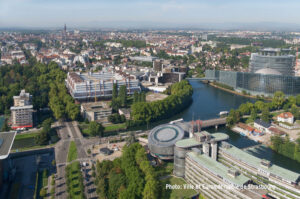MEP: Ukraine Is a Heating Crisis, Not a Gas Crisis
- News
- 28 January 2015
- by EurActiv
Interview published on EurActiv

Member states must cooperate with each other and submit to a European Commission-run governance structure, complete with punitive measures, if the EU is to become independent from Russian gas, argues Morten Helveg Petersen, who also stressed the importance of renewables and energy efficiency.
Morten Helveg Petersen is a Danish Member of the European Parliament. An ALDE member, he sits in the Parliament’s Committee on Industry, Research and Energy. He spoke to EurActiv’s Deputy News Editor James Crisp.
Does anyone actually know what Energy Union is, or will be?
No, not yet. Clearly, this is one of the biggest pressures that the new European Commission is under. It’s a work in progress to put it diplomatically. There’s a lot of curiosity about this.
We’ve all seen a lot of papers and concepts about it. We are moving away from an Energy Union that is all about negotiating gas contracts with Putin, but it is still being defined.
It’s a great new project in a really dramatic period of EU history.
What do you want to hear from Maroš Šef?ovi?? (Commission Vice-President in charge of Energy Union)
There is an irony in the fact that the EU was founded because of security of supply issues, of coal and steel, and now 50 to 60 years later, we have a situation where too many countries are overly dependent on Russian gas.
We have to rise and meet these challenges. We have to have more independence from Putin. It calls for action from EU to define the energy union and for increasing cooperation between member states.
Member states are very busy saying energy mix is their prerogative, but we need to have more cooperation. I would like to hear Šef?ovi? coming out strongly in favour of increased governance in these matters.
There is also the open question of a governance structure to ensure the EU can hit its EU-wide target for renewables under the 2030 climate and energy framework.
This is one of key questions. In the absence of binding targets, what do we do in terms of achieving independence and combatting climate change? We have to develop some kind of governance system where member states report on these various targets. There has to be some reporting and some follow-up from the Commission.
Any follow-up from the Commission has to have a punitive element to work…
We really have to consider punitive elements. With issues such as Ukraine and Putin at the back of things, we have to make progress on these things. I wouldn’t rule anything out in terms of punitive measures.
This big dilemma is some member states are being very reactive on this, not wanting any binding targets and insisting on energy as a national thing. And we need the opposite – ambitious targets and binding goals. We are up for difficult discussions.
How can the EU use less Russian gas?
In the long-term, the key is renewables and energy efficiency. But there’s a lot to be done. Initially, we thought about the Ukraine crisis as a gas crisis. It’s actually more of a heating crisis. We have to come up with way – and the Juncker investment plan will have a role in this – to roll out more district heating and cooling systems in order to increase independence in the long-term.
But can we really rely on renewables? Are people prepared to do that? In contrast, energy efficiency seems to be widely accepted by policymakers…
We see some member states having a high share of renewables in their electricity consumption. This is no longer a fringe thing. This is for real. It has to be taken very seriously and can really contribute to the energy mix.
Yes, there is acknowledgement about energy efficiency, but there seems to be quite a step from this realisation to actually putting it into practice. You have some progressive initiatives from locally-elected mayors and governors, but at a central level there are member states refusing to have EU-based targets. Energy efficiency policies are not a given, in my opinion.
Electricity interconnectors are very important …
Interconnectors are key to having stable and security supplies and to being able to transmit electricity and energy across Europe.
Yes, it is definitely a challenge, and the answer is to have an increase in interconnectors. Even in the case of Denmark [a leader in renewable energy]. We have a cable running to Germany that has been shut down way too often because of local energy production in Germany.
Issues like that provide a really serious challenge, and we are a long way from having this ability be a reality.
Some studies say the Ukraine crisis will lead to a disproportionate focus on gas infrastructure. Do you think there is a risk of white elephants pipelines?
I definitely think we have to watch out for this. Initially, the focus was predominantly on gas and gas infrastructure. It’s important to broaden the scope, so energy security is not synonymous with gas.
Are you worried that energy efficiency will fall off the radar of policymakers?
That’s my worry. It seems to me so obvious that this is part of the solution not only in the short term, but also the long-term. Clearly there are big opportunities to save energy, reduce energy dependence and create local jobs [through energy efficiency policies] .
Given that the Juncker Commission has withdrawn the Circular Economy package, do you have faith in their environmental credentials?
They promised to come back with a more ambitious proposal. This is something to watch out for and we [European Parliament] will hold them to account. .
They haven’t given much detail on the new package yet have they?
Nope.
Given falling oil prices, is now the time to increase sanctions on Russia and press the advantage?
We should keep all our options on the table. What is happening recently shows how difficult it is to predict Putin’s next move.
Latest News
-

-
 26.10.2021 Celsius Summit 2021 – Energy Democracy
26.10.2021 Celsius Summit 2021 – Energy Democracy

